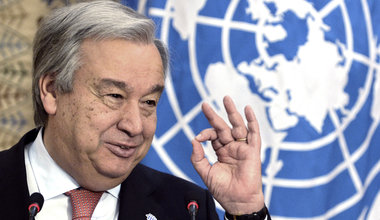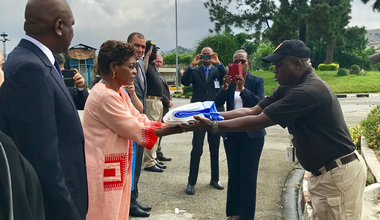UNOCI’s volunteers make donation to nursery in Man
Man, 25 September 2009... The United Nations Volunteers Programme (UNVP) of the United Nations Operation in Côte d'Ivoire (UNOCI), on Wednesday, 23 September 2009, donated hairdressing, dressmaking and gardening equipment to the reception and reintegration centre for children in difficulty at a nursery in Man, 600 kilometres west of Abidjan. Estimated at a cost of around 340,000 FCFA, the donation was part of the UNVP support to local development initiatives.
The nursery, known as the Pépinière de Man, is a charitable NGO, which provides shelter and training for young people, street children and other children made vulnerable by the crisis, especially war orphans, abandoned children and children from unwanted pregnancies. Its centre provides training for 522 children in three cycles: a nursery school, a primary school and a vocational centre. UNOCI rehabilitated and equipped it in 2007, at a cost of 22 million FCFA, through its Quick Impact Projects (QIPs) programme.
Welcoming the gesture of the UN volunteers, which she said would be beneficial, the head of the nursery, Josephine Koffi Anicet, said that the equipment would satisfy the institution's needs with regard to providing practical training for its students. "Through this action by the UNV, I realize that volunteering really exists and I send my gratitude to all those men and women who work everyday for the welfare of others, without being asked". Mrs. Koffi specified that the equipment would be used to educate the children on the importance of being part of a voluntary service, so that they in turn can transmit their knowledge to others.
Speaking on behalf of UNOCI, the Public Information Officer in Man, Marie Puchon, explained the meaning of voluntary service, which is "putting your knowledge and your experience at the service of those who need it without expecting anything in return". She welcomed the efforts of volunteer nurses, teachers and teaching assistants who work at the centre and launched an appeal for solidarity towards the beneficiaries, so that they can make a commitment to volunteering: "It is good to work and be paid, but it is better to help for the greater welfare of others by giving them a little of your time and experience in an instinctive way," she added.
"The goodwill that you show encourages us to continue in the voluntary service and gain satisfaction from that. We are grateful to you for it," concluded Mrs. Koffi.
 UN
UN United Nations Peacekeeping
United Nations Peacekeeping



